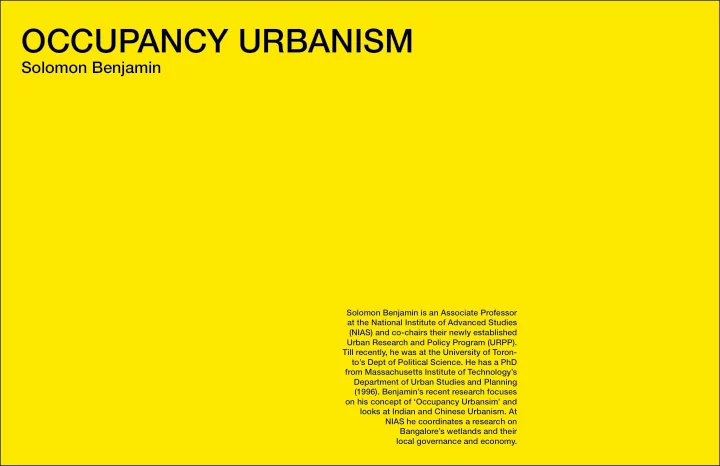

OCCUPANCY URBANISM Solomon Benjamin Solomon Benjamin is an Associate Professor at the National Institute of Advanced Studies (NIAS) and co-chairs their newly established Urban Research and Policy Program (URPP). Till recently, he was at the University of Toron- to’s Dept of Political Science. He has a PhD from Massachusetts Institute of Technology’s Department of Urban Studies and Planning (1996). Benjamin’s recent research focuses on his concept of ‘Occupancy Urbansim’ and looks at Indian and Chinese Urbanism. At NIAS he coordinates a research on Bangalore’s wetlands and their local governance and economy.
I propose the concept of Occupancy Urbanism as a way to read the every- day city and its spaces of politics.
The city is understood as an intense dynamic that is being built incrementally via multiple contestations of land and location. This site, built around land, economy and complex local politics, is shaped by multi- dimensional historicities embedded in daily practice.
OCCUPANCY URBANISM 10 Theses
I OCCUPANCY URBANISM REFLECTS CITIES BEING INCREMENTALLY DEVELOPED AND VIA THE ACTIONS OF MULTIPLE AGENTS (RATHER THAN HEGEMONIC MASTER PLANNING)
II OCCUPANCY URBANISM SIGNIFIES DE FACTO AND DIVERSE MULTIPLE LAND TENURES Thus, de facto implies an act of proactive settlement by occupants claiming locations, rather than a centralised authority allocating land (with dejure titles) as per policy.
III OCCUPANCY URBANISM POSITS THAT LAND FORMS THE BASIS FOR ECONOMY Occupancy Urbanism shows how incrementally developing land around diverse tenures forms the basis for a substantive economy. A third critical aspect relates to a dynamic economy unconstrained by intellec- tual property rights (IPR) and driven by an intensive and innovative ‘copy culture’. While this happens via the interconnected nature of production/distribution, and promotes the blurring of work relationships between workers and shop-owners and managers, it is also shaped by the intersecting dynamics of both incremental production and land development. REINFORCES PROXIMITY
IV OCCUPANCY URBANISM IMPLIES A ‘LOCALITY’ POLITICS VIA EMBEDDED INSTITUTIONALISATION This embeddedness allows occupants to play the system,and to use their councillors to pressure higher-level political and administrative circuits when municipal councils are disem- powered. It is this materiality linked to the upgrading infrastructure that builds popular and extensive political consciousness of how to work the municipal system.
V OCCUPANCY URBANISM IMPLICATES MULTIPLE HISTORICITIES THAT ARE LOCALITY-EMBEDDED AND CONNECT ECONOMY TO LAND AND POLITICS
VI OCCUPANCY URBANISM INVOLVES RADICAL VISION The main conceptual element here is that of how diverse land tenures open up multiple claims to real estate surpluses. As land is settled and spurs a politics to make the possibility of new infrastructure and services more real and de facto tenure more secure, land values rapidly rise. Given the dynamics and diversity of tenure and its multiple claimants, this implies that when the vast majority of city terrain can be ÂreadÊ as being incremen- tally developed, it is not a mere Âphysical formÊ: it also shows the extensive materialisation from a new conceptualisation of real estate. Such an understanding of the radical in urbanism does not imply that real estate values get distributed equally. Instead, the radical is embedded in complex stories of real life, disjointed in both joy and sorrow, and shaped by uncertainty and risk.
VII OCCUPANCY URBANISM MODULATES THE EXISTING LAWS OF PROPERTY Occupancy Urbanism appropriates and disfjgures the concept of ÂpropertyÊ in real estate. It is also in effect doing so in law. An urbanism that is extensive, embedded in local society economy and politics, and built around de facto and multiple tenures, promotes a plurality of law. Occupancy Urbanism points to the space of politics that opens up when subverting the defjnition of property in law. This takes place not through being explicitly rejected as an ÂalternativeÊ; rather, it happens via appropriation within the municipal procedures, extending to other layers of public institutions, and from the lower judiciary upwards to higher levels.
VIII OCCUPANCY URBANISM HAS A CENTRAL ROLE IN MOVING POLITICS BEYOND ‘POLICY’ One could argue that one aspect of neo-liberal globalisation has been the use of ‘policy’ to emphasise ‘property’: the privatisation of water, the attempt to defjne land titles, the emphasis on strict zoning to allow resource generation. Here, a faith in progressive policy frames is as naïve (and even as dangerous) as that of advocacy planning and ‘civil society’.
IX OCCUPANCY URBANISM IS INVOLVED IN THE PRODUCTION, DISTRIBUTION AND CONSUMPTION OF ARTiFACTS The street here, despite the incredibly high real estate values of Juhu, allows porosities reminiscent of those described by Walter Benjamin in his essays on Naples. Such streetscapes fmourish everywhere as resilient locations of day-today consumerism, and of capital itself occupied.
X OCCUPANCY URBANISM FOCUSES ON CONTEMPORARY FORMS OF NEO-LIBERAL GLOBALI- SATION AND AT LEAST THREE OF ITS CORE ELEMENTS: ACCESS TO SPACE; ACCESS TO REAL ESTATE SURPLUSES; AND ACCESS TO BRANDED RETAIL MARKETS
At stake here are not just the material aspects, but also a popular consciousness that acknowledges these as normative to modernity. The preceding arguments and analyses suggest that Occupancy Urbanism shows serious fractures in this assumption of an easy and inevitable global hegemonic. It subverts the ability of international capital to extract surpluses from rapidly developing city peripheries – via diverse forms of land tenure routing real estate surpluses into small-fjrm economies and into municipal government. In doing so, it also occupies spaces in uneven and unpredictable ways, and pushes a fmexible legality that bogs down Mega politics, to appropriate real estate surpluses where opacity restricts centralised access and accumulation.
Recommend
More recommend